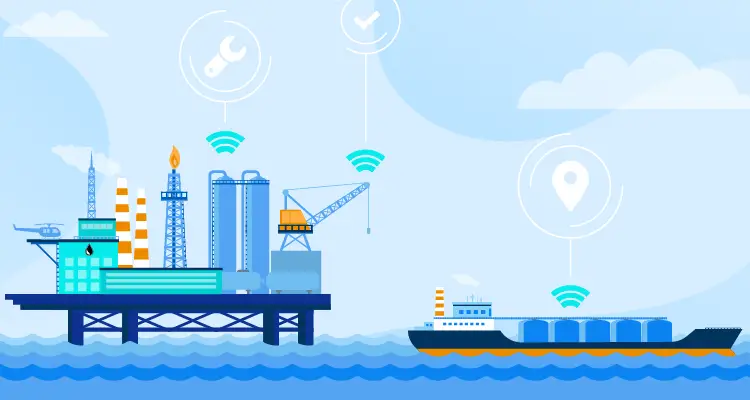The demand for the oil and gas industry is rising day by day. People, especially transportation, are investing in this industry significantly. The sustainability of this industry is permanent due to growing demands for oil and gas. Technology is dominating every sector and mass use of IoT is taking place everywhere. As a result, it is affecting the oil and gas industry significantly.

IoT in oil and gas is revolutionizing its operations and automating several business processes. It can reduce the expensive downtown time, automate several operations, and improve efficiency by performing among all production stages. As there are many benefits, business owners of oil and gas firms can take control of various things just by sitting at their desks. Continue reading the blog to explore more:
Why Does the Oil and Gas Industry Need IoT?
According to projections, the Internet of Things (IoT) market in the oil and gas industry is anticipated to experience a significant growth rate of 21.86% from 2019 to 2024. This growth is expected to result in a market value of $43.48 billion by 2024. Implementing IoT in oil & gas means establishing sensors incorporating devices and company mechanisms. It improves decision-making, safety, and efficiency. Now it’s time to explore why oil and gas industry needs IoT:
Improve Data Collection
IoT helps companies reach every corner of the appliances, buildings, or infrastructure from a single space. For instance, IoT sensors can be deployed on pipelines, compressors, pumps, heat exchanges, mud cleaners, and more.
Virtual Control
Having IoT gives remote access to every vital part of the industry. Administrators can control every single operation from any corner of the world. With the help of advanced data analytics, businesses can make better decisions to improve operations.
Collect And Analyze
IoT gives access to data and activity of every equipment and corner of the company live on the monitor. Thus, the admin can maintain changes and make effective decisions in their business.
Take Action Now and Revolutionize Your Oil and Gas Business with IoT!
Experience the transformative power of the Internet of Things with RisingMax in your operations. Embrace smarter, safer, and more efficient upstream, midstream, and downstream processes today.
Advantages Of Embracing IoT In The Oil And Gas Industry
Implanting IoT in the petroleum industry is quite beneficial. Check more of them below:
Real-time Visibility
Oil and gas companies can monitor their facilities, delivery trucks, and ships using Internet of Things (IoT) solutions that display real-time fleet operations, environmental conditions, and equipment performance and safety status.
Ameliorate Business Operations
IoT sensors can update live happenings in business operations. This lets businesses acquire necessary employees and saves costs.
Hazard Management
IoT technology leaks help prevent hazards by detecting them early before breakage. Hazards like gas leaks, equipment failure, and malfunction can be easily detected by using IoT technology in gas detectors & oil factories.
Decision Making
Data collection by IoT lets admins look into the valuable insights of the company. It allows management to create strategies for better business operations by analyzing real-time data.
Inventory Management
IoT lets businesses track and manage stock levels. Admins can look into the dashboard to know the available stock quantity and when to add or upgrade it. This practice reduces the likelihood of stock shortage or tackles an overstock situation.
Reduced Maintenance Costs
With the help of data from the Internet of Things (IoT), predictive maintenance can identify issues before they become serious ones, saving money on downtime and extending the life of the equipment.
Improved Environmental Monitoring
The use of IoT sensors can help us greatly improve environmental stewardship and ensure regulatory compliance. These sensors allow for continuous monitoring of emissions and waste management, which is crucial for maintaining a sustainable and responsible approach to our environment.
Also Read: IoT Software Testing Services
Types Of IoT Sensors Used In The In The Oil And Gas Industry
Some hero IoT sensors are helping the oil and gas industry. Let’s explore some of the next-generation sensors:
Temperature Sensor
A temperature sensor is programmed to maintain an equipment’s temperature. When the temperature exceeds, it bells an in-built alarm and advises administrations. It helps prevent leaks and maintain flow rates and gas levels.
Proximity Sensor
A proximity sensor helps detect missing objects without needing physical contact. It emits electromagnetic or beam electromagnetic radiation, which spreads around and detects the object. It directly connects with the admin’s system and informs them about the error.
Pressure Sensor
It is a device that measures pressure and converts it into an electrical signal. The measuring process of this sensor depends on the level of oil/gas pressure over it, then it increases its voltage, denoting the increase in pressure.
Humidity Sensor
It is also known as a Hydrometer, which measures the presence of moisture in a particular environment. It measures air temperature and ratio of present molecules in the atmosphere and generates a report. It helps in maintaining the quality of oil and gas.
Electro-Optical Sensor
These sensors are smart and convert light into electronic waves. They can detect radiation and can convert them into ultraviolet wavelengths. It is used to detect disturbed oil quality, temperatures, flow rate, etc.
Level Sensor
The level sensors are designed for heavy-duty operations. These are capable of calculating temperature, vibration, and electromagnetic interference. These sensors also can tell the quantity of oil and gas in a tank.
Gas Sensor
The gas sensor detects the presence of gas in a tank. It can be used to detect a variety of gasses, gas leaks, and gas explosions and help in improving safety protocols. Gas sensors also can sense the presence of CO2 in a particular space.
Take advantage of RisingMax’s experienced IoT engineers and industry consultants to unlock the potential of advanced technology for your business.
IoT Use Cases In Oil And Gas Industry
IoT offers a broad range of use cases at every level of the business industry. Let’s explore some of the key use cases of IoT in the Oil & Gas industry.
1. Exploration And Production
The exploration is the process of finding a drilling site that is reserved for crude oil and minerals. IoT plays a major role in locating such sites so that they can be processed further for production; let’s explore in depth:
Seismic Data Acquisition And Analysis
Real-time seismic data collected through IoT-enabled sensors provide valuable insights into subsurface structures and accelerate exploration. IoT data combined with advanced analytics help create precise reservoir models, enabling better decision-making in drilling and extraction processes.
Drilling Optimization
IoT devices can monitor drilling parameters in real-time, such as pressure, temperature, and equipment performance, which can help to make instant adjustments and enhance drilling efficiency. Predictive maintenance, powered by IoT data, can help to identify potential equipment problems before they escalate, minimizing downtime and maximizing equipment lifespan.
Production Monitoring And Optimization
Continuous monitoring by IoT sensors detects anomalies and optimizes output through automated control of production processes in real-time, reducing operating costs.
2. Pipeline Monitoring And Maintenance
With the help of IoT, it provides computational pipeline monitoring for workers. It helps monitor pressure, temperature, and density and can analyze thousands of points at once. Explore more:
Leak Detection And Prevention
IoT sensors continuously monitor pipelines, enabling real-time leak detection and minimizing environmental impact through early warning systems.
Pipeline Integrity Management
IoT technology enables continuous monitoring of pipeline corrosion rates, helping identify areas requiring attention and reducing the risk of pipeline failure. Predictive maintenance based on IoT-generated data minimizes downtime and extends the lifespan of pipelines.
Energy Consumption Optimization
IoT applications are suitable in optimizing consumptions such as solar panels and wind turbines, reducing reliance on traditional fossil fuels. Its smart data analytics helps optimize energy usage, reduce waste, and minimize environmental footprint.
Also Read: IoT In Supply Chain Management
3. Refining And Processing
It is the process of converting crude oil into petroleum. The crucial processes like separation, conversion, and treatment are aided by IoT these days. Know more:
Process Optimization And Control
IoT app gives proper ownership on elements such as temperature, pressure, and flow rates, improves efficiency and productivity. Utilizing advanced analytics enables decision-makers to make data-driven decisions, which can lead to the optimization of refining and processing operations.
Equipment Monitoring And Predictive Maintenance
Real-time monitoring of oil and gas equipment via IoT devices enables predictive maintenance to detect potential equipment issues, reducing downtime and extending equipment lifespan.
Safety And Environmental Monitoring
IoT sensors enhance safety and environmental monitoring in refining and processing facilities. Continuous monitoring of critical parameters such as gas leaks and emissions helps prevent accidents and ensures compliance with safety and environmental regulations.
4. Oil and Gas Logistics And Distribution
IoT also possesses the process of managing transportation. Learn in detail:
Fleet And Asset Tracking
IoT technology is a game-changer when it comes to tracking vehicles and assets in real time. It optimizes routing and asset utilization, allowing companies to monitor their assets closely, reduce fuel consumption, and minimize downtime.
Remote Monitoring
In storage facilities, IoT-enabled sensors provide real-time data on critical parameters like temperature, pressure, and the presence of hazardous gases. This data allows for remote monitoring, ensuring safety and security while optimizing storage operations.
Smart Billing
In oil and gas distribution, IoT technology helps with accurate data collection, leading to efficient billing processes. Smart metering, in particular, is a real-time monitoring system that optimizes billing accuracy and enhances the customer experience.
Boost Your Oil and Gas Business with IoT Solutions
The oil and gas industry is being transformed by the Internet of Things (IoT), which is automating operations, improving business efficiency, and enhancing safety norms. IoT technology has numerous applications that optimize processes, cost cutting, and minimize environmental impact, from exploration and production to pipeline monitoring, refining, and distribution.
RisingMac Inc. is a leading IT company in New York, USA. We have a lot of experience in developing IoT applications for every industry. Connect with our experts today and start your dream project.















